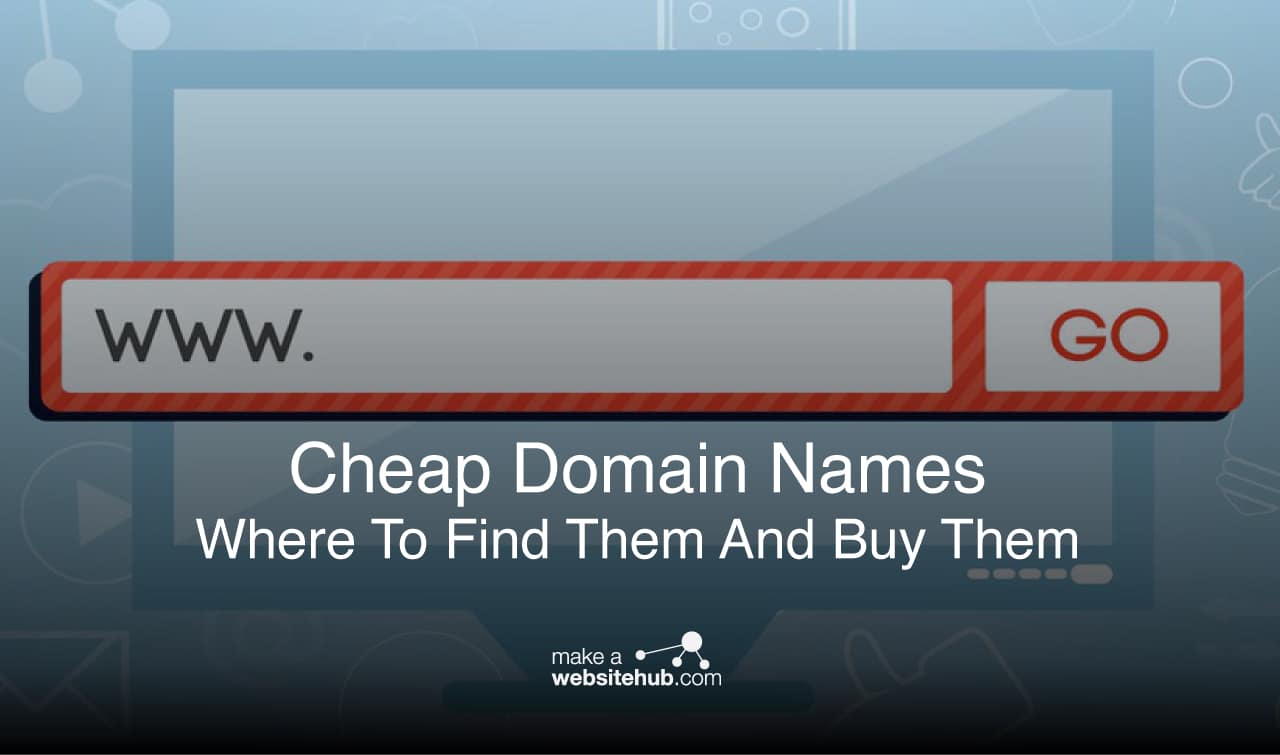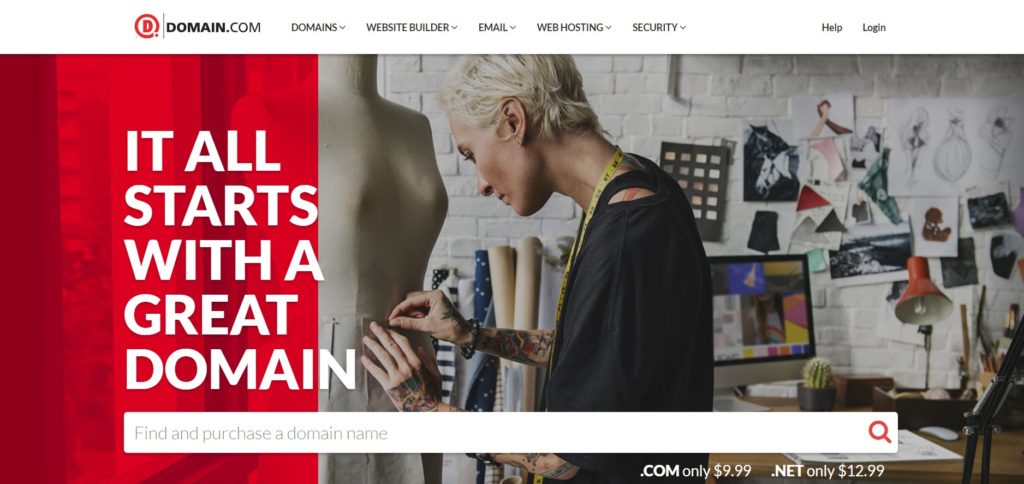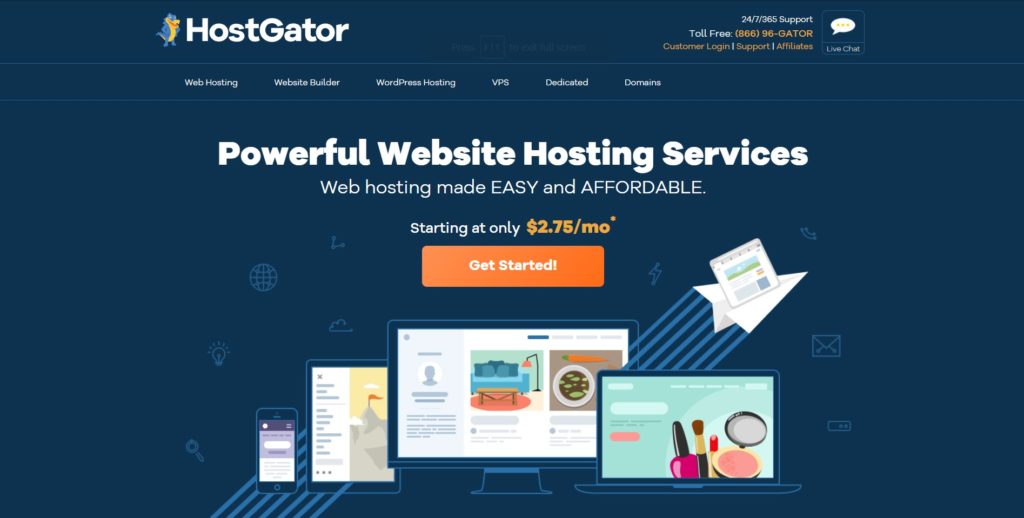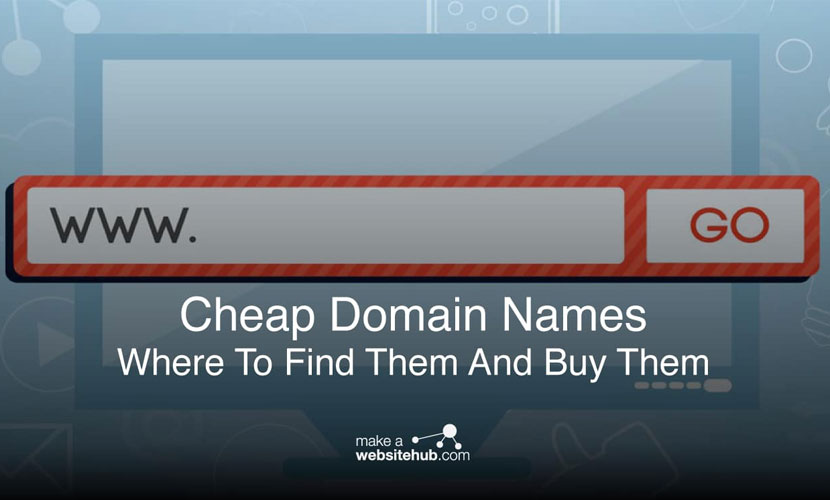Reviews
Cheap Domains – Where To Buy The Cheapest Domain Names

Cheap Domains-Creating and publishing a website is not always a cheap endeavor. Most people don’t realize just how many things they have to pay for to get a site up and running. Not only do you have to pay for development, but there’s also web hosting and domain registration to worry about. Depending on the size and capabilities of your site, your website costs can start adding up pretty quickly.
One way that you can save on your overhead costs is by purchasing a cheap domain. Domains are one of the most important parts of your site. It’s how people will visit your digital space and it reflects your overall brand. For most things, a lower price tag indicates poor quality. With domains, that’s not the case.
Several of the best domain registrars offer affordable domains. There are also web hosting providers that will take care of the registration process for you and offer you a free year of domain registration. These options can help you get your site established without breaking the bank. In this guide, we’ll go over some of the cheapest domain names around. Before we do that, it’s important to understand the basics of what a domain is and what a registrar can do for you.
What is a Domain
To put it simply, a domain is an identifiable name that you use to access a site. Behind the scenes, the Internet operates on a series of numbers. Every single computer, mobile device, and website has a unique IP address. The IP address, also known as the Internet Protocol address, is what devices use to access a site’s server and download data so that it appears on your screen.
IP addresses are very long and difficult to remember. So, domains were developed to make things easier for the average Internet user. The domain name is registered to the IP address. Whenever a visitor types your domain into their browser’s address bar, the computer does a quick scan of the Domain Name System server, which is like a massive Internet phone book. The server tells the computer what IP address the domain is attached to and brings the browser to that digital space. All of this happens within seconds.
While it sounds complicated, the process is relatively simple. At the end of the day, domain names make the Internet much more accessible. Instead of remembering a random string of numbers, you can use a memorable domain to access your favorite site.
What About a Domain Extension?
Domain extensions are the letters that go after your domain in your URL. They’re also called top-level domains, or TLD. Some examples would include “.com” or “.gov.” Domain extensions serve a number of different purposes. Primarily, they are used to identify the site’s mission or geographical location. For example, “.com” is for commercial sites while “.gov” is reserved for government-related sites.
Extensions are coordinated and regulated by the International Corporation for Assigned Names and Numbers, which is commonly referred to as ICANN. This organization is responsible for coming up with new top-level domains. While everyone is familiar with “.org” and “.net” domain extensions, there’s actually over a 1,000 to choose from. ICANN’s new generic top-level domain program added a ton of unique extensions that can help your site stand out.
Extensions are an important part of your domain because it’s the thing you’re paying for. You can register virtually any domain name that you want as long as it doesn’t infringe on someone else’s rights or is already taken. However, there are only so many domain extensions that you can use. In most cases, the popularity of the extension is what determines registration and renewal costs.
Is the Domain the Same as Hosting?
New website owners often confuse domains with hosting. While they both play an important role in getting your site viewed by the masses, they’re two totally different things with their own separate costs. The domain is what’s used to direct visitors to your site. Hosting is where your site is actually stored. Visitors access the hosting server, where all of your site’s content and data is, through the domain.
Many web hosting providers offer registrar services as well, which is usually the source of confusion. However, you don’t have to register your domain with your hosting provider. You can use multiple companies and services. Though, registering the domain with the hosting provider does offer some benefits. For one, you’re only billed by one company. This can help you stay organized and make it easier to keep track of expenses. Secondly, many providers offer a free domain for your first year if you’re a new member.
What is a Domain Name Registrar?
The registrar is the company that handles all of the assigning duties for your new domain. They will register your domain name and assign it to your site’s IP address. The registration and renewal fees cover these services. These companies have to be accredited by ICANN to officially qualify as a registrar.
It’s important to remember that you’re paying for registration services when you buy a domain. Once you have paid those fees, the domain is yours. Registrars do not own the domain or the domain extension. If you’re unhappy with the service you receive, you can always transfer your domain to another company. As long as you keep up with renewal fees, you don’t have to pick a new domain when you change companies. The domain you choose is yours to keep for as long as you want it.
How Much Do Domains Typically Cost?
The price of a domain is influenced by many different factors. The biggest is the popularity of the domain extension and overall availability. For a cheap domain, you can expect to pay around $15.00 a year. During your first year, prices can be as low as $0.99. Many registrars and hosting companies offer attractive introductory fees to get new customers in the door.
After your first year, you will have to renew your domain on a yearly basis to keep it active. At this point, you will be paying the normal price, which is usually between $10.00 and $20.00 for cheap domains. Some registrars also allow you to register the domain for many years at once, which is a great option if you don’t want to worry about forgetting to pay renewal fees.
Now, those prices reflect the average cost of cheap domain names. If you’re looking to invest in a popular domain, you might have to spend a pretty penny. Popular extensions can cost hundreds of dollars a year. If you want to buy an existing domain, the price goes even higher. Some .com domains have sold for several million dollars. In our digital world, domains are a hot commodity, so some of the best and most recognizable have a significant price tag.
What Does the Domain Price Include?
The price that you pay for a domain should include all of the basic services that the registrar has to do. This includes registering your new domain and assigning it to the IP address. The registration and renewal price should also include the ICANN fee. ICANN charges a very small annual fee for every domain on the web. It’s also charged for transfers. Currently, the ICANN fee is only $0.18.
Some registrars also offer additional services. The most popular is domain privacy, which helps to keep some of your personal information on the WHOIS database private. This comes with an additional cost. You may also encounter hidden fees. Make sure that you read the fine print to ensure that the registrar you choose doesn’t have unnecessary fees tacked on.
How to Choose a Solid Domain Name
Your domain is very important when it comes to your site’s brand identity and Internet presence. It’s the first thing visitors will encounter when they visit your site. Before you buy domain name services, take some time to come up with a good idea that you can stick with. Here are a few tips on how to choose the best domain name for when your setting up a site or starting a blog.
Represent Your Site
A domain name should always represent the site. It should give visitors a good idea of what to expect before they click. The most popular method for choosing a domain name is to use your personal name or company name. You could also include your location, market niche, or any other identifier.
Make It Easy to Remember
Domain names are meant to be memorable. Steer clear of hyphens or random numbers. The fewer the characters, the better. You don’t want to confuse your visitors or make them accidentally visit a site that’s not yours. Try saying your domain name out loud. If it’s easy to pronounce, it’s easier to remember.
Make Sure That It’s Legal and Available
Before you try buying a domain, you need to make sure that it’s available. Do a quick Google search and take a look at the WHOIS database. The database includes every registered domain. If you find that the name you want is already taken, you can also use the database to find some contact information for the owner.
Another thing to consider is the legality of the name. The last thing you want to deal with after paying for a domain is a lawsuit. Make sure that the name doesn’t include any trademarks.
Use a Domain Name Generator
If all else fails, you can use a domain name generator. Advanced generators can help you come up with a great domain name in only a few minutes. They use basic information about your site to create options that are relevant and memorable.
Consider Domain Hacking
Domain hacking is a fun way to make your domain stand out. It involves using the domain and the extension to create memorable words or phrases. Some examples include “Burri. to” or “fun.zone.” Just use your imagination and get creative. Hacked domains are easy to remember and can be used for marketing.
What to Look for in Domain Registrars
Beyond low prices, there are many things to look for when you’re searching for the right domain service. Not all registrars operate the same. To save yourself some headaches in the future, keep the following factors in mind.
Proper Accreditation and a Solid Reputation
We mentioned earlier that registrars need to be accredited by ICANN. It’s important to look for that accreditation. There are plenty of unscrupulous entities out there that are pretending to be reputable registrars in an attempt to take your money. To gain that seal of approval from ICANN, companies have to meet a number of requirements. This helps to keep the industry regulated and honest.
ICANN keeps a list of accredited registrars for convenience. It can be used to quickly identify which companies to work with. However, when it comes to reputation, you’ll need to do a bit more research on your own. It’s a good idea to check with the Better Business Bureau and see how long the company has been in business. A good track record of service is always a good sign.
Good Customer Support
The domain name registration company you go with should have a good support team that you can contact when issues come up. Take a look through their website and see if there’s a knowledge database or FAQ section. Also, see what methods of contact are available. Having a live chat feature, telephone number, and ticketing system will make it much easier to get help when you need it.
Optional Features
Finally, look for additional features that you want to invest in. Private domain features, such as NameCheap’s WHOIS Guard, are great for keeping your contact information on the down-low. They do cost extra, but they can also keep your email inbox free of junk and prevent random strangers from contacting you.
Domain Registration Scams and Traps
Unfortunately, during your search for the lowest price for domains, you’ll encounter companies that care more about money than providing quality service. There are several scams and pitfall that novice website owners experience. These issues can end up costing you more money in the long run, so you need to be careful. As if that wasn’t enough, some of these traps are perfectly legal due to the fine print.
Some of the most common problems come from the WHOIS database. After the registration process is finished, some companies will charge you to make changes to your personal information in the database. Even if the error not due to a fault of your own, you’ll have to pay extra. Some registrars also do some shady things if you purchase a private domain. Instead of registering your private information, they’ll attach the domain to the company. So, if you try to transfer the domain to another service or get involved with any legal issues, the paper trail says that they own your domain.
Registrar locks can lead to some issues as well. Locks were developed to reduce your risks of domain slamming, which is a fraudulent attempt to get you to accidentally transfer your domain to a more expensive registrar. Unfortunately, that lock can also prevent you from legitimately transferring your domain to another registrar without paying a hefty fee.
Generally, registrars have your best interests in mind. However, all it takes is one bad egg to ruin the entire experience. To avoid these traps, make sure that you read the fine print of your contract. If there’s anything questionable, move on to another company.
Where to Get Cheap Domains
Whether you go with a dedicated domain registrar or a company that also offers to host services, it’s not hard to find affordable domains. These registration companies offer a wealth of options that won’t break the bank.
Domain.com

Domains.com is a company that focuses primarily on being a registrar. They do offer some hosting packages and a website builder, but the domain services are what they’re most known for. The company has been in business since 2000 and has a pretty reliable support team that’s available around the clock.
When it comes to prices, Domain.com has a lot of choices. Their collection of available TLDs is quite large, providing you with plenty of options to save on registration costs.
Cheap Domain Pricing
.biz – $5.99 for the first year, $12.99 a year for renewals
.com – $9.99 for the first year, $13.99 a year for renewals
.stream – $2.99 for the first year, $2.99 a year for renewals
.bid – $2.99 for the first year, $2.99 a year for renewals
NameCheap.com

NameCheap is a heavy-hitter in the domain industry. The company has a pretty solid reputation and offers a slew of different domain extensions. Premium domains are available, but there’s no shortage of cheaper generic TLDs.
NameCheap also offers a free privacy feature, called WHOIS Guard. Additional website services are available as well. These include WordPress hosting, SSL certificates, and more.
Cheap Domain Pricing
.com – $8.88 for first year, $12.98 a year for renewals
.net – $12.98 for first year, $14.98 a year for renewals
.co.UK – $7.58 for the first year, $9.58 for renewals.one – $8.88 for the first year, $10.88 for renewals
Bluehost.com
As one of the largest hosting providers around, it’s only natural that Bluehost would offer domain registration services. Many cheap domain options are available.
The thing we like about Bluehost is that they offer a free domain for your first year if you buy one of their hosting plans. With the low costs of their shared hosting packages, you can get your site up and running without spending a fortune.
Cheap Domain Pricing
.xyz – $14.99 for the first year, $19.99 a year for renewals
.texh – $4.99 for the first year, $19.99 a year for renewals
.site – $2.99 for first year, $12.99 for renewals
.us – $8.99 for the first year, $15.99 for renewals
You can also use this handy little tool to see if your domain name idea is available to buy.
HostGator.com

HostGator offers flexible hosting plans to suit anyone’s needs. New members can take advantage of introductory pricing and get a free domain for the first year.
Even if you go to HostGator for domain registration alone, you can save a lot of money with their cheaper options. The company can also transfer domains, renew your domain automatically, and provide privacy protection.
Cheap Domain Pricing
.club – $9.95 for the first year, $15.00 a year for renewals
.site – $0.99 for the first year, $15.00 a year for renewals
.online – $9.95 for the first year, $15.00 for renewals
.com – $7.95 for first year, $17.99 for renewals
GoDaddy.com
GoDaddy is, perhaps, one of the most popular registrars in the industry. The company currently manages over 78 million domains. While they do try to upsell you on additional services, the basic domains are quite cheap. Plus, they’re discounted for your first year. You can set up domain renewals and perform domain transfers as well.
Cheap Domain Pricing
.cloud – $4.99 for the first year, $14.99 a year for renewals
.work – $4.99 for the first year, $9.99 a year for renewals
.com – $0.99 for first year, $17.99 for renewals
.club – $0.99 for first year, $17.99 for renewals
Hover.com
With hundreds of available domains, you won’t have any issues finding an affordable option at Hover. The registration website is designed to enhance the user experience. You can easily search for individual and bulk domain pricing. The company doesn’t offer a ton of extra features like some of its competitors. But if you’re looking for cheap domains and nothing else, Hover is a great registrar.
Cheap Domain Pricing
.net – $15.49 for first year, $17.49 a year for renewals
.com – $12.99 for first year, $14.99 a year for renewals
.it – $14.99 for first year, $14.99 for renewals
.org – $13.99 for first year, $15.99 for renewals
The Cheapest Domain Extensions
If you’re looking to save the most money possible, you can go with a cheap domain extension. The following extensions are currently some of the most affordable. Use this list to come up with ideas of how you can name your site.
- .agency: $4.99/year at Domain.com
- .xyz: $1.00/year at NameCheap
- .bid: $2.90/year at Domain.com
- .online: $4.99/year at Bluehost
- .tech:$3.95/year at HostGator
- .date: $2.99/year at Domain.com
- .club:$1.37/year at NameCheap
- .download: $2.99/year atDomain.com
- .site: $0.95/year at HostGator
- .loan: $2.99/year at Domain.com
- .store: $2.99/year at GoDaddy
- .men: $2.99/year at Domain.com
- .org: $8.99/year at Bluehost
- .info: $2.99/year at GoDaddy
Conclusion
You don’t have to go broke starting a website. Whether you own an online business or a personal blog, a cheap domain can help you save on operating costs while getting a name that stands out from the crowd. Many registrars offer deeply discounted rates, introductory offers, or a free domain name to get you started. Remember, your domain is only one thing you have to pay for while you run a website. By going cheap when it comes to domains, you can put your money towards better hosting or development services.
>>>Join The One Funnel Away Challenge<<<






























